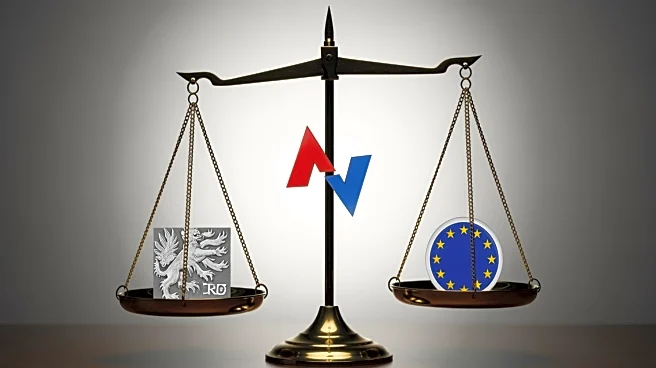What's Happening?
The Dutch general election has resulted in an unprecedented tie between the far-right Party for Freedom and the centrist D66, with each party securing 26 seats. This outcome, reported by the Dutch national
news agency ANP, marks the first time in Dutch history that two parties have ended an election tied for the lead. The close result is expected to delay the formation of a new coalition government, a process that could take weeks or even months due to the fragmented political landscape in the Netherlands. The election has drawn comparisons to other tight races globally, including the 2000 U.S. presidential election, which was decided after a contentious recount in Florida.
Why It's Important?
The tie in the Dutch election underscores the growing political fragmentation and polarization within the country, reflecting broader trends seen in other democracies. The delay in forming a coalition government could impact the Netherlands' ability to address pressing issues such as economic policy, immigration, and climate change. Additionally, the rise of the far-right Party for Freedom highlights the increasing influence of populist movements in Europe, which could have implications for EU policies and international relations. The situation in the Netherlands may serve as a bellwether for similar political dynamics in other European nations.
What's Next?
The next steps involve negotiations among Dutch political parties to form a coalition government. This process is expected to be complex and lengthy due to the tie and the diverse political landscape. Key stakeholders, including party leaders and members of parliament, will play crucial roles in these discussions. The outcome will determine the direction of Dutch policy on various issues, including economic reform and international relations. Observers will be watching closely to see how the far-right's influence shapes the new government and its policies.
Beyond the Headlines
The tie in the Dutch election may have deeper implications for the country's political culture, potentially leading to shifts in voter alignment and party strategies. The rise of the far-right could prompt other parties to reassess their platforms and approaches to coalition-building. Additionally, the election results may influence public discourse on national identity and multiculturalism, as the far-right Party for Freedom is known for its strong stance on immigration and national sovereignty.











